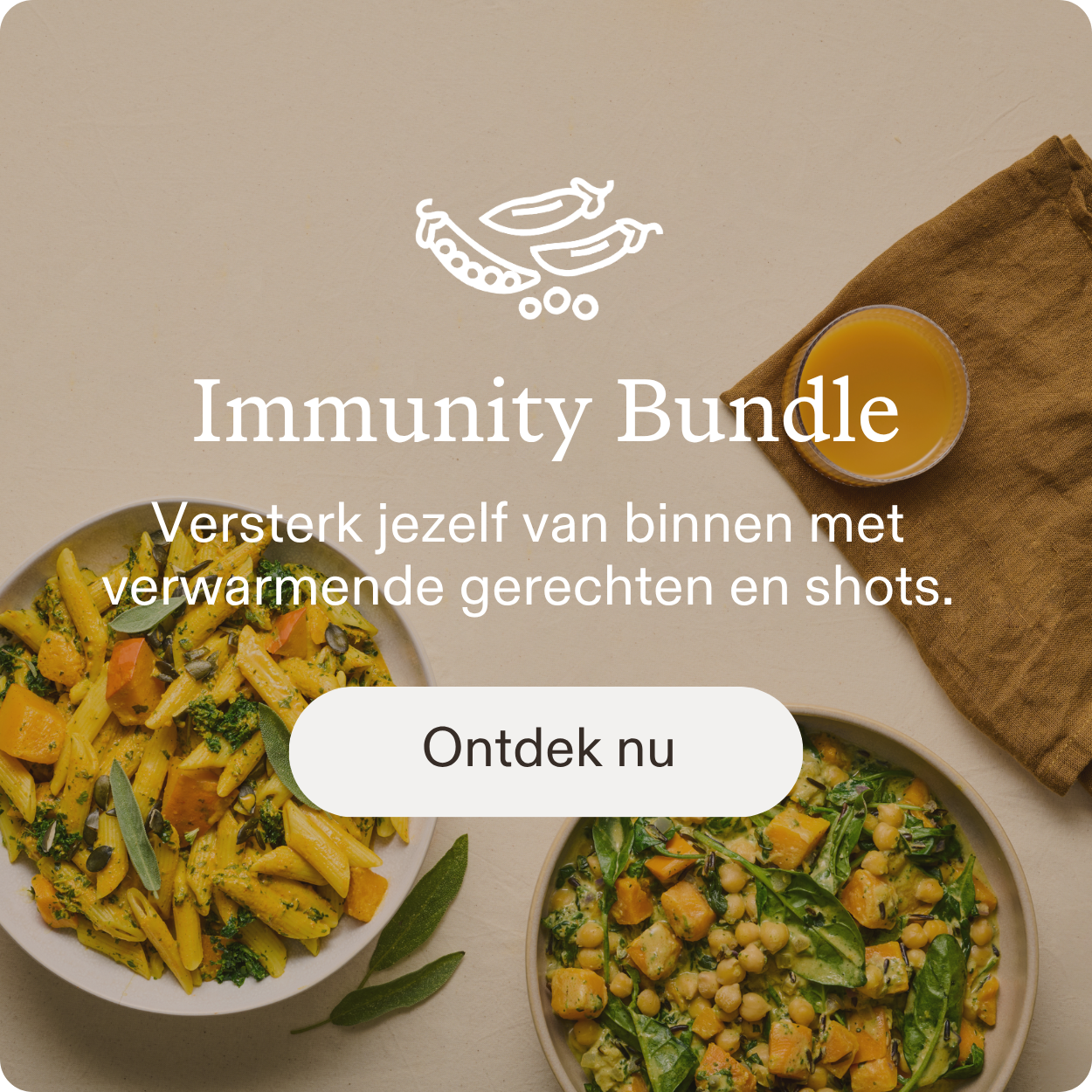Een sterk immuunsysteem met een gezond dieet
Ontdek hier welke belangrijke rol je voeding speelt bij het versterken van je immuunsysteem en welke voedingsmiddelen je in je dieet moet opnemen!

The body and the immune system
Picture your immune system as a little tiny army, ready to protect you from harmful bacteria, chemicals, viruses etc and mitigate their potential for damage. Depending on how strong your immune system is, will influence how much the pathogens will influence our health. A strong immune system will be powerful enough to fend off the flu and colds. A weak or weakened immune system is challenged by smaller pathogens and likely to fall ill. Individuals whose body defenses are impaired by immunodeficiencies, certain diseases such as HIV, autoimmune diseases or allergies, should therefore make an extra effort to protect themselves.
In addition to the passive function of our defenses, you can actively help strengthen your immune system with the help of a balanced diet and thus get through the year fit and healthy.
A healthy diet for a strong immune system
Your winter wardrobe contains everything necessary to keep your body nice and warm throughout the winter? That's a great start! But are you aware of what an important role your nutrition plays in maintaining a healthy immune system?
This is related to our gut bacteria. It is composed of a number of bacteria and fungi, such as lactic acid bacteria and yeasts, and interacts with other organs to promote a strong immune system. A healthy intestinal flora is a prerequisite for:
- Strengthening of intestinal function
- Production of vitamins
- Toxin degradation
- Production of short-chain fatty acids
- Prevention of the growth of harmful bacteria
The ABC of a strong immune system
To guarantee healthy functioning of your gut bacteria, and therefore supporting your immune system, you need to supply your body with the right diet. This should consist of a healthy breakfast and dinner, as well as a nutritious dinner.
The following vitamins and minerals should be included:
Probiotic and Prebiotic Foods
Probiotic
The microorganisms harbour lactobacilli, bifidobacteria and yeasts, which strengthen the intestinal wall and thus contribute to healthy intestinal flora.
Foods like yogurt, kefir or fermented cabbage are a great source of probiotics. Cucumbers, beans and sourdough or Asian foods like miso and kimchi also contain probiotics.
Prebiotics
As a nutrient for lactobacilli and bifidobacteria, dietary fibre supports the production of short-chain carbohydrates important for a healthy intestinal mucosa, healthy bacterial growth and thus a strong immune defense.
Fruit and vegetables as well as grains are a superfood for your gut and filled with prebiotics. Bananas, onions, garlic, linseeds, barley, legumes and nuts all support a healthy gut and digestion.
Strengthening your immune system: Vitamins
Here an overview of which vitamins are important for your immunity:
- Vitamin A
Vitamin A is found in many animal-based products, but can also be found in some vegan products. It consists of provitamin A as well as B-carotene (carotenoid), which is converted into vitamin A and prevents cell damage caused by free radicals. Vitamin A also supports the formation and growth of skin and mucous membrane cells and strengthens vision.
Vitamin A is in plant based foods such as sweet potatoes, carrots, kale, spinach and tomatoes.
Pro tip: spicier foods tend to be higher in Vitamin A.
- Vitamin B
B Vitamins include Vitamin B6 and Vitamin B12. They facilitate a functioning metabolism, cell growth, blood cell development, wound healing as well as a healthy nervous system. Furthermore, Vitamin B6 can help weaken free radicals and strengthen cell structure.
Vitamin Bs can be supplied through your diet, but can’t be stored without additional intake. Vitamin B can be found in overnight oats, grains, legumes, seeds, mushrooms, coffee, and cabbages
- Vitamin D
You should also pay attention to your vitamin D intake. A deficiency can cause both physical and psychological fatigue. According to the Robert Koch Institute, vitamin D is necessary for healthy bone metabolism, the absorption and integration of calcium and phosphate, bone mineralization and the formation of proteins. Studies show that a Vitamin D deficiency can cause chronic ailments like Type-1 Diabetes, cardiovascular diseases, as well as bone and muscle aches or weaknesses.
An optimal supply of Vitamin D can be achieved through Vitamin D supplements as well as exercise in the fresh air – predominantly on sunny days. This supports the natural production of Vitamin D, improves the mood and strengthens the immune system.
Vitamin D is found in mushrooms and fish but not many other foods.
The German Nutritional Society recommends 20µg/day.
Other nutrients to support your immune system
- Iron
One of iron’s most important job is to support the production of blood and therefore the absorption of nutrients. An iron deficiency can lead to anemia because it impedes the production of white blood cells and weakens the immune system.
Iron-containing foods that you should incorporate into your diet include: nuts, pistachios, hazelnuts, linseeds, sunflower seeds, and pumpkin seeds. Other foods like whole grains, oats (used for Overnight Oats), spinach, legumes like white beans, chickpeas or lentils and cabbages facilitate the strengthening of our immune system.
Tip: iron is absorbed best when in combination with vitamin-c containing foods, orange juice or supplements. Tea, coffee, wine, and legumes conversely impede the absorption of iron.
- Zinc and Omega-3-fatty acids
The trace element and mineral zinc and omega-3 fatty acids participate in the formation of white blood cells and stimulate the action of T-cells. This helps to strengthen our immune cells to fight against bacteria and viruses.
The foods with the richest content are sadly beef and pork. However, there are suitable vegan options as well, which include oats, vegan yoghurt and beans. Supplements can also be used!
Free radicals and the right defence
A poor diet, UV radiation, environmental toxins, stress, and certain stimulants - are the culprits of the formation of free radicals. If our cells cannot adequately fight them off, oxidative stress is stimulated which can weaken the body. In the long term, this can affect our physical and mental health. A weak immune system, in turn, is conducive to the formation of free radicals, which is why strengthening our defences is so essential.
- Antioxidants
In case you have an intake of free radicals, eating antioxidant-rich foods can help act as a remedy. Yellow, red and green fruits and vegetables, like apples, carrots, berries, tomatoes, grapes and spinach are sources of vitamin C and suppliers of secondary plant substances such as beta-carotene. Vegetable oils, whole grain products and legumes cover the need for vitamin E.
Tip: Dark chocolate with a high cacao percentage is a source rich in phytochemicals and helps your body prevent free radicals and strengthen your cardiovascular system.
- Vitamin C
This is one of the key players in protecting your body from potential illness. It will help support you to stay healthy throughout the fall and winter months. In addition to supplements, there are a variety of naturally occurring vitamin C sources.
Citrus fruits like lemons or oranges, cabbages like kale and broccoli, spinach, peppers, as well as currants, sea buckthorn and rosehip, are great sources of Vitamin C
A hot lemon tea, or a spicy ginger shot are well known home-remedies that are great additions to your diet throughout the winter and flu season.
Tip: a few of our vegan Every. Bowls contain cabbage or spinach, and would be a great nutritious option!
- Vitamin E
Vitamin E facilitates cell communication and helps prevent cardiovascular diseases. Green vegetables like broccoli, plant oils like sunflower or rape seed oil, as well as nuts and seeds are a good source of Vitamin E. Our Udon Noodle recipe includes most of these ingredients!
Holistic immune strengthening
Is all this enough? A healthy diet plays a big role in maintaining a strong immune system. However, it won't get you very far if other important factors are neglected. In addition to a healthy diet, you should maintain a healthy work-life balance, get enough fresh air, exercise regularly and get enough sleep.
Nutrition and the immune system
The right diet cannot be neglected, if you want to achieve a healthy immune system. Foods rich in vitamins and nutrients, combined with supplements and a general healthy lifestyle, will not only support a healthy body but in doing so will also improve quality of life.
Other exciting topics:
- Eating in the Home Office – A Relaxed Lunch Break
- Morning Routine – Hacks for a Productive Day
- Refreshing Hacks – Make Drinking Water Fun
- Food for Your Nerves – How Certain Foods Can Help With Stress
- Healthy Dinner – What's Best for You and Your Body
For even more foodie-content follow us on Instagram and join the Facebook Community to get involved in meal creations and to stay up to date on all things Every.

